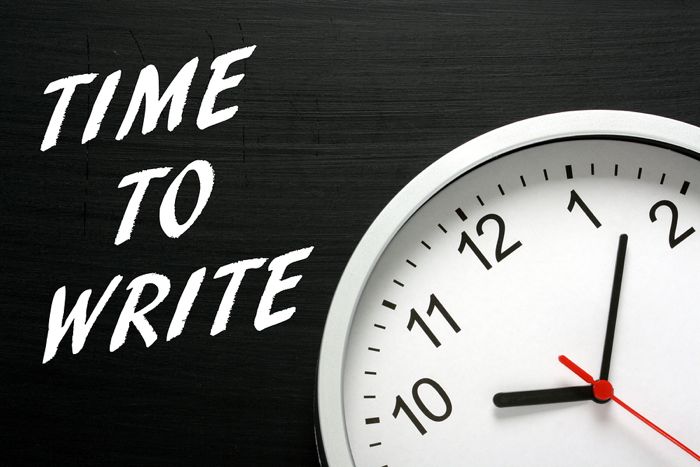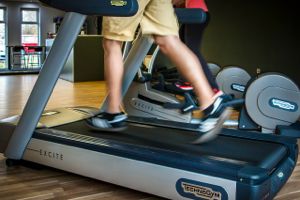To reach your writing goals, you have to know how to boost your writing willpower.
You need it when it’s time to write and you’re tired. When you get that rejection and you feel too discouraged to keep going. Or when the writing gets hard in the middle of the novel.
Some days your willpower is strong. Tired or not, you go to the keyboard and you write. Other days, however, it feels like that blank page is just asking too much of you.
On those days, what do you do?
I’ve got seven ways you can energize your willpower. Some of them will surprise you, but I encourage you to try them. Even when you’re feeling strong, drop some fuel in your willpower tank. You’ll need it on a more stressful day.
 Boost Writing Willpower Tip 1. Watch some of your favorite re-runs.
Boost Writing Willpower Tip 1. Watch some of your favorite re-runs.
If you have a favorite show from years gone by, make a point to get the DVDs and watch them when you need a willpower boost. According to two studies from scientists at the University of Buffalo, when participants watched reruns of their favorite fictional shows, they experienced a restoration of their energy levels and a renewal of their willpower.
“When you watch a favorite re-run,” said study author Jaye Derrick, “you typically don’t have to use any effort to control what you are thinking, saying or doing. You are not exerting the mental energy required for self-control or willpower. At the same time, you are enjoying your ‘interaction,’ with the TV show’s characters, and this activity restores your energy.”
Just watching whatever was on television didn’t have the same effect. Derrick noted that it was the interaction with favorite characters—which also occurred when re-reading a favorite book, by the way—that boosted willpower and energy.
2. Watch some cat videos…or any funny video.
This one seems equally perplexing, but scientists have found that watching those famous cat videos helps boost energy and positive emotions, which can help you re-engage your willpower when you need it.
About 7,000 people were surveyed as part of the study, and the results showed that they felt less anxious and sad after watching a cat-related online video. The findings were so positive that it suggests you could use Internet cat videos as a form of stress relief.
Watching a funny video can have the same effect, and if you’re not a cat fan, it may work even better for you. According to a 2015 study, exposure to humor “increased individuals’ persistence in two different tasks.” On top of that, the participants worked twice as long on a subsequent task as those who were exposed to videos about neutral topics.
“Although humor has been found to help relieve stress and facilitate social relationships,” the study authors concluded, “the traditional view of task performance implies that individuals must concentrate all their effort on their endeavors and should avoid things such as humor that may distract them from the accomplishment of task goals. We suggest that humor is not only enjoyable but more importantly, energizing.”
What video did the participants watch? One from the “Mr. Bean” comedy. Check it out here.
Boost Writing Willpower Tip 3. Limit the decisions you have to make prior to your writing time.
Scientists believe that every time you make a decision, you use a muscle in the brain. Over time, that muscle can become fatigued. That means if you’ve had to make a bunch of decisions all day long, and then you have to decide whether or not to write, you’re willpower is going to cave.
I spoke in depth about this decision-making muscle in a previous post, “The Surprising Thing Writers Can Do To Improve Quality of Writing.” Suffice to say that you can do two things to boost your willpower here:
- Schedule your writing time early in the day before your willpower becomes fatigued, and
- limit the number of decisions you have to make each day to keep your willpower strong.
That means plan ahead. Plan your weekly meals on the weekend. Have leftovers ready to go. Lay your clothes out the night before. Schedule some downtime during the week. Give yourself every opportunity to keep your willpower going.
 4. Eat first.
4. Eat first.
Interestingly enough, we seem to have more willpower after a meal than we do if we wait a few hours after we’ve eaten.
Researchers reported on this in 2011. They examined over 1,000 judicial rulings made over a 10-month period. The judges were deciding whether to grant prisoners’ parole. Results showed that decisions made after a meal break were more likely to favor parole, while those made later in the day were more likely to favor continued jail time.
“We record the judges’ two daily food breaks, which result in segmenting the deliberations of the day into three distinct ‘decision sessions,’” the researchers wrote. “We find that the percentage of favorable rulings drops gradually from ≈65% to nearly zero within each decision session and returns abruptly to ≈65% after a break.”
These findings seem to support the idea that willpower dwindles as blood sugar goes down and the brain has less glucose for fuel. According to a 2007 study, self-control requires a certain amount of glucose, and when the level drops, we have a harder time exerting our willpower. Indeed, scientists discovered that one act of self-control depleted glucose levels in the blood, making it more difficult for people to succeed on another task of self-control. But consuming a glucose-containing drink fixed the problem.
“A single act of self-control causes glucose to drop below optimal levels, thereby impairing subsequent attempts at self-control,” the researchers wrote.
So again, try to limit the activities requiring your willpower that you have to do before writing. Then if you feel your willpower waning, get some food energy. Just be smart about it. Something with too much fat and sugar will likely make you tired. Try a high-protein snack instead, like some yogurt, nuts, peanut butter on toast, or a boiled egg.
Boost Writing Willpower Tip 5. Keep exercising.
Yep. It’s the magic bullet for just about everything. And here we are again—if you want to strengthen your willpower, keep up with your exercise routine. If you don’t have one, get one right away.
In a two-experiment series, researchers tested participants’ self control before and after a period of regular exercise. They first tested the participants by asking them if they wanted $5 now, or $15 a week from now (a measure of self-control). They then had them engage in a two-month walking and jogging program, urging them to maintain a pace that felt challenging but sustainable.
After the exercise program was over, scientists tested the participants’ self-control again, and found that most exhibited greater levels of willpower in delaying gratification, and that those effects lasted a month after the training stopped.
Researchers noted that the results suggested normal people could change and improve their self-control with regular physical activity.
 6. Meditate.
6. Meditate.
Studies suggest that meditation builds self-control and willpower. Makes sense. You have to have willpower to sit still and focus for 10 or more minutes at a time, right?
In a 2009 study, scientists observed the brains of 37 dieters while they looked at 50 photos of various foods, rating each by healthiness and taste. Results showed that the area of the brain activated by people who had high levels of willpower was the same area as that which is active during meditation.
Other studies have shown that mindfulness meditation can help restore depleted willpower. In 2012, scientists reported that participants who had just had to complete a task that depleted their self-control performed poorly on a subsequent task measuring self-control. Those who meditated after the first task, however, performed just as well on the second task as participants who had not had to complete the first self-control task.
“This finding suggests that a brief period of mindfulness meditation may serve as a quick and efficient strategy to foster self-control under conditions of low resources,” the researchers wrote, which means if you find your willpower lagging before a writing period, taking just 5-10 minutes to meditate may help you power through.
Boost Writing Willpower Tip 7. Get enough sleep.
You know how it goes. On those days when you’re tired, your willpower goes right out the window.
There’s a reason for that. In a 2015 study review, researchers noted that chronic sleep loss and impaired self-control go together.
“A sleep-deprived individual who has expended the necessary resources for self-control is at an increased risk for succumbing to impulsive desires, poor attentional capacity, and compromised decision making,” they wrote.
They went on to say that poor sleep habits, such as inconsistent sleep times and inadequate sleep, negatively affect self-control in a variety of ways. They also found that sufficient sleep helped replenish ability to self-regulate.
Some studies have found that when we’re sleep deprived, we will choose the less challenging of two tasks to complete. That means if you have to choose between writing and doing the dishes, most likely you’ll choose the dishes, because they require less mental energy. This is not the outcome you want (unless your sink is piled high with dishes).
The researchers wrote, “good sleep habits could refuel a person’s ability to make more difficult choices instead of opting for the easier choice or the easier task.”
Sleep deprivation is also associated with decreased brain activity and impair divergent thinking (your creativity). So if you want to keep your willpower and creativity strong for your writing, do your best to get at least seven hours of sleep each night.
How do you restore your willpower?
Sources
Dan Diamond, “Just 8% of People Achieve Their New Year’s Resolutions: Here’s How They Do It,” Forbes, January 1, 2013; https://www.forbes.com/sites/dandiamond/2013/01/01/just-8-of-people-achieve-their-new-years-resolutions-heres-how-they-did-it/#2b7df4e4596b.
Sara Saldi, “Favorite TV Reruns May Have Restorative Powers, Says UB Researcher,” University at Buffalo, [Press Release], September 6, 2012; http://www.buffalo.edu/news/releases/2012/09/13646.html.
Jessica GallMyrick, “Emotion regulation, procrastination, and watching cat videos online: Who watches Internet cats, why, and to what effect?” Computers in Human Behavior, November 2015; 52:168-176, http://www.sciencedirect.com/science/article/pii/S0747563215004343.
David Cheng, Lu Wang, “Examining the Energizing Effects of Humor: The Influence of Humor on Persistence Behavior,” Journal of Business and Psychology, December 2015; 30(4):759-772, https://link.springer.com/article/10.1007%2Fs10869-014-9396-z.
Scott Stump, “Watching funny cat videos at work can boost your productivity according to study,” Today, March 15, 2016, https://www.today.com/pets/watching-funny-cat-videos-work-can-boost-your-productivity-according-t80311.
Shai Danziger, et al., “Extraneous factors in judicial decisions,” PNAS, April 26, 2011; 108(17):6889-6892, http://www.pnas.org/content/108/17/6889.
Gaillliot MT, et al., “Self-control relies on glucose as a limited energy source: willpower is more than a metaphor,” J Pers Soc Psychol., February 2007; 92(2):325-36, https://www.ncbi.nlm.nih.gov/pubmed/17279852.
Sofis MJ, et al., “Maintained Physical Activity Induced Changes in Delay Discounting,” Behav Modif., July 2017; 41(4):499-528, https://www.ncbi.nlm.nih.gov/pubmed/28033718/.
“Caltech Researchers Pinpoint the Mechanisms of Self-Control in the Brain,” Caltech News, April 30, 2009, http://www.caltech.edu/news/caltech-researchers-pinpoint-mechanisms-self-control-brain-1530.
Malta Friese, et al., “Mindfulness meditation counteracts self-control depletion,” Consciousness and Cognition, June 2012; 21(2):1016-1022, http://www.sciencedirect.com/science/article/pii/S1053810012000104.
June J. Pilcher, et al., “interactions between sleep habits and self-control,” Front Hum Neurosci, 2015; 9:284, https://www.ncbi.nlm.nih.gov/pmc/articles/PMC4426706/.





I would add that sleeping at night, and not in the wee hours through to 10am (mostly the case of seasonal workers) helps being in better spirits.
As of cats, interaction with actual cats also helps. This adds to the legend that writers and cats go together.
One important thing is to not get overwhelmed by multiple projects just to not say no to friends. Saying no, for writers, is a necessity. We cannot take on long-term projects in the middle of the drafting of a novel.
A little bit more of self love and respect is due!
Thanks Alessandro! Some good thoughts, especially the saying “no” when needed. Tough at times but necessary!